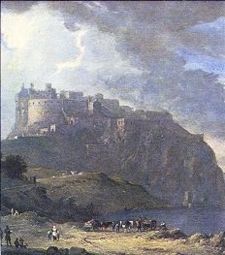 Last week I was researching my current WIP (work-in-progress), part of which will take place in Scotland and I was looking up information about the Clearances in Scotland, when the land was taken from the crofters and consolidated for bigger profits. Not that my story has anything to do with the Clearances, certainly not the Highland Clearances or anything Highland, but I needed to know just for a throwaway line.
Last week I was researching my current WIP (work-in-progress), part of which will take place in Scotland and I was looking up information about the Clearances in Scotland, when the land was taken from the crofters and consolidated for bigger profits. Not that my story has anything to do with the Clearances, certainly not the Highland Clearances or anything Highland, but I needed to know just for a throwaway line.
I came upon this in a History of Scotland page:
In 1810 Scott publishes The Lady of the Lake, a stirring historical poem of love and adventure. Loch Katrine, in a rugged gorge of the Trossachs, is the home of the heroine, Ellen Douglas. The beatiful Ellen’s Isle commemorates her, nestling in the loch against a background of high hills.
The poem is an immediate success. A new hotel is built to accomodate the rush of tourists, who wander through the landscape with their copies of the book, finding the exact spots in which to declaim the relevant passages. The Highlands acquire an aura for tourists which they have never lost.
The more things change the more they stay the same! I immediately thought of today’s tourists scampering about Europe and the UK on Da Vinci Code tours! It is rather comforting to me that people are the same in so many ways, even if they lived a long time ago.
Here for a taste of what our Regency ladies and gentlemen read in that poem is the beginning of Sir Walter Scott’s The Lady of the Lake:
Harp of the North! that mouldering long hast hung
On the witch-elm that shades Saint Fillan’s spring
And down the fitful breeze thy numbers flung,
Till envious ivy did around thee cling,
Muffling with verdant ringlet every string,–
O Minstrel Harp, still must thine accents sleep?
Mid rustling leaves and fountains murmuring,
Still must thy sweeter sounds their silence keep,
Nor bid a warrior smile, nor teach a maid to weep?
Cheers!
Diane

I love all the reseach we do for a throwaway line. LOL!
A few years ago I read a published version of the travel diaries of a late 18th-century gentleman, whose custom was to go touring through England every year on horseback, starting from his home in London and taking a different route every time. He would send his servant ahead to book a room and dinner at an inn in the next town, while he himself lingered to see the sights along the way.
The diaries were very interesting, both in what has changed and what is the same. He wrote several times that the owners of stately homes or old ruins would do very well to print up a brief guide for the benefit of tourists. Nowadays most places do offer such guides, which I guess is progress. 🙂 But he also complained constantly about how everything was going to the dogs, which still hasn’t changed.
Todd-who-wishes-he-could-send-a-servant-ahead-to-order-dinner
Todd, you can. With this cool thing called a telephone.
Cara
I think part of being a tourist is being interested in the past, at least that’s what this had me thinking of. And it reminded me that even back in the New Kingdom of Egypt probably looked at the pyramids sort of like we do because they were still built so many years before them, albeit not as many as us. LOL 🙂 But the idea that it’s always great to know that some things never change. . . it’s like when I go to a new city, as long as that McDonalds is there, I’m happy. 🙂
Lois
Oooh, Todd. Do you remember whose diaries you read?
Cara, Hee hee hee hee.
Todd, I MUST HAVE THIS DIARY. Title and info please. Pretty pretty please?
Diane and Kalen,
The published version is called “Byng’s Tours: the Journals of the Hon. John Byng 1781-1792,” edited by David Souden. It’s published by National Trust Classics, so not sure how easy it would be to get here. I also hope I haven’t oversold it to you! 🙂 But I thought it was very interesting.
The unfortunate thing is that apparently he left diaries of 12 different tours, but only three are included in that edition. It’s possible that there is a scholarly edition of the whole thing, somewhere; I’ve never looked for one.
Anyway, I hope if you find it that it proves helpful!
Todd-who-has-always-vaguely-wondered-what-that-annoying-ringing-object-was
Thanks, Todd!
Diane